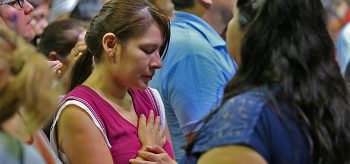
Since the beginning of Billy Graham’s evangelistic career, he preached the Gospel to people from all ethnicities, origins and languages. And Spanish speaking people were never an exception.
With its new Hispanic Initiatives ministry, the Billy Graham Evangelistic Association wants to be even more intentional in reaching out to the Spanish speaking population, which continues to grow in the United States.
“The Hispanic community in the United States faces very specific challenges, and we want to meet them in their needs with the hope that can only be found in Jesus Christ,” said Angel Jordán, director of Hispanic Initiatives at BGEA.
As a part of these initiatives, the organization held a meeting with dignitaries from Spanish speaking countries and Hispanic church leaders from North Carolina and South Carolina to strengthen the relationship with them—and to present BGEA’s vision to serve the Hispanic community in the area and across the nation.
Official representatives from the consulates of Mexico and Guatemala attended the event held in Spanish in late August, along with honorary dignitaries from El Salvador, Honduras, Nicaragua and Spain.
“We invited you not only because we want you to get to know our Hispanic Initiatives and the work that we are doing, but also because we want to get to know you,” were the welcoming words of Chris Swanson, vice president of Hispanic Initiatives for BGEA.
“The BGEA has a great potential to help our communities with emotional assistance, which is so very needed in these hard times we are going through, particularly because of the pandemic,” said Claudia Velasco, consul general of Mexico in Raleigh.
Daniel Moore García, a pastor from Statesville who attended the meeting, explained, “Our community is struggling with mental health problems like depression and anxiety. The pandemic just worsened the situation. People are being prescribed medications, and I believe that is good, but they need more than that.
“It would be great if BGEA could help our community to receive a more holistic attention, prioritizing their spiritual needs.
“I have been working as a pastor for nearly 20 years and I have seen that Hispanic nonbelievers suffer greatly from loneliness and nostalgia for their country and family, and here lately, they have added fear and anguish [because of the pandemic]. Most people don’t have real friends, and helping them to get involved in a church becomes almost therapeutic for them.”
A Cuban pastor in Charlotte, Amittay Rodríguez, commented, “I have seen a frightening increase of domestic violence among the Hispanic community. Many people live isolated because of fear, and because of lack of knowledge of their rights. BGEA has so much to offer them by sharing the Gospel, sharing truth, and also training and caring for the pastors of these people.”
The BGEA team wanted to reach out to Hispanic leaders because they know first hand the struggles that their community has been facing.
“This is an effort to present the initiative, and also to establish relationships with you, so that together we can find the best strategies to serve and to reach out to the Hispanic community in our area,” said Swanson in Spanish.
“The pastors of this area are very excited. They say, ‘They are finally looking our way, they are paying attention to the Hispanic community,’” said Jordán.
Swanson closed the event saying: “We want to convey the heart of Hispanic initiatives. We want to let you know that we are not seeking to reach out to you just to put a mark on our checklist, but that this outreach really comes from the heart of Rev. Franklin Graham, as well as all of us in the leadership.
“Our desire is to hear from you and to learn. We are going to continue to meet with Hispanic church leaders in the United States to listen and to talk and to learn how God is moving in the midst of their communities and in their home countries. We want to be sensitive to that. All of us here agree that our heart’s desire is simply to say, ‘God, where are you working? Because that’s where we want to be.’”


